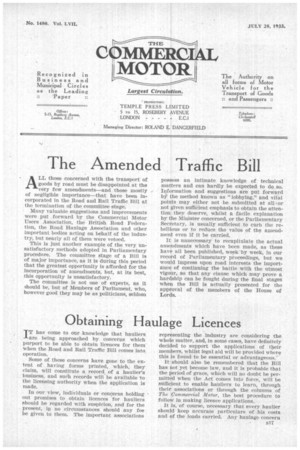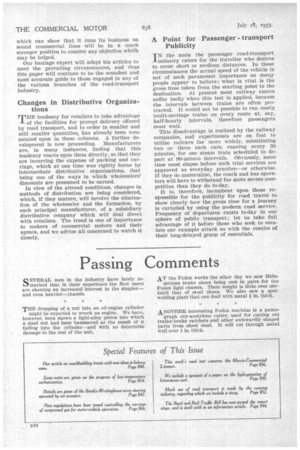Obtaining Haulage Licences
Page 35

Page 36

If you've noticed an error in this article please click here to report it so we can fix it.
IT has come to our knowledge that hauliers are being approached by concerns which purport to be able to obtain licences for them when the Road and Rail Traffic Bill comes into operation. .
Some of these concerns have gone to the extent of having forms printed, which, they claim, will constitute a record of a haulier's business, and such records will be available to the licensing authority when the application is made.
In our view, individuals or concerns holding out promises to obtain licences for hauliers should be regarded with suspicion, and for the present, in no circumstances should any fee be given to them. The important associations representing the industry are considering the whole matter, and, in some cases, have definitely decided to support the applications of their members, whilst legal aid will be provided where this is found to be essential or advantageous.'
It .should also be remembered that the Bill has not yet become law, and it is probable that the Period of grace, which will no doubt be permitted when the Act comes into force, will be sufficient to enable hauliers to learn, through their associations or through the columns of The Commercial Motor, the best procedure to follow in making licence applications.
It is, of course, necessary that every haulier should keep accurate particulars of his costs and of the loads carried. Any haulage concern B17 which can show that it runs its business on sound commercial lines will be in a much stronger position to counter any objection which may be lodged.
Our haulage expert will adapt his articles to meet the prevailing circumstances, and thus this paper will continue to be the soundest and most accurate guide to those engaged in any of the various branches of the road-transport industry.
Changes in Distributive Organizations
THE tendency for retailers to take advantage of the facilities for prompt delivery offered by road transport, and to order in smaller and still smaller quantities, has already been commented upon in these columns. A further development is now proceeding. Manufacturers are, in many instances, finding that this tendency reacts upon them directly, so that they are incurring the expense of packing and carriage, which at one time was rightly borne by intermediate distributive organizations, that being one of the ways in which wholesalers' discounts are presumed to be earned.
In view of the altered conditions, changes in methods of distribution are being considered, which, if they mature, will involve the elimination of the wholesaler and the formation, by each principal manufacturer, of a subsidiary distributive company which will deal direct with retailers. The trend is one of importance to makers of commercial motors and their agents, and we advise all concerned to watch it closely.
A Point for Passenger transport Publicity
TN the main the passenger road-transport -I-industry caters for the traveller who desires to cover short or medium distances. In these circumstances the actual speed of the vehicle is not of such paramount importance as many people appear to believe ; what is vital is the gross time taken from the starting point to the destination. At present most railway routes suffer badly when this test is applied, because the intervals between trains are often protracted. It would not be possible to run costly multi-carriage trains on every route at, say, half-hourly intervals, therefore passengers must wait.
This disadvantage is realized by the railway companies, and experiments are on foot to utilize railcars far more widely, substituting two or three such cars, running every 30 minutes, for one steam train scheduled to depart at 90-minute intervals. Obviously, some time must elapse before such trial services are appreved as everyday practice—or otherwise. If they do materialize, the coach and bus operators will have to withstand far more severe competition than they do to-day.
It is, therefore, incumbent upon those responsible for the publicity for road travel to show clearly bow the gross time for a journey is curtailed by using the modern road service. Frequency of departures exists to-day in our sphere of public transport ; let us take full advantage of it before those who seek to emulate our example attack us with the results of their long-delayed grasp of essentials.




































































































